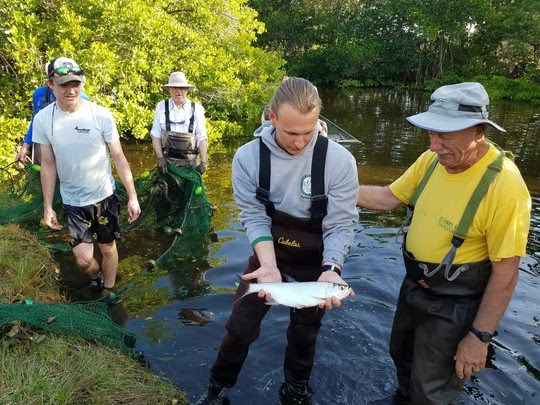Supplemental Feeding of Manatees in Indian River Lagoon EndsThe supplemental feeding trial at the Temporary Field Response Station ended on March 31. With warmer water temperatures most of the manatees have naturally dispersed from their warm water refuges. The number of manatees visiting the site continues to decrease since feeding stopped last week; for example, on Saturday, April 2, staff observed 40 manatees, but by Tuesday, April 6, they only saw six animals. Staff will continue to monitor manatees at the site to watch for distressed animals. Even though the Joint Unified Command (UC) winter enhanced support operations are scaling down, agency staff, volunteers, and our many partners within the Manatee Rescue & Rehabilitation Partnership (MRP) will continue to work tirelessly to rescue and care for manatees needing help. With limited space at critical care facilities this winter, the MRP partners, the FWC, and the U.S. Fish and Wildlife Service worked to strategically move animals among the partner facilities to keep valuable space available and two new facilities joined the partnership. As of this week, there are 87 manatees in rehabilitation (19 of these have been identified as UME-related rescues) at 14 critical care or rehabilitation/holding facilities: 71 in Florida, 2 in Georgia, 12 in Ohio, 1 in Texas and 1 in Puerto Rico. Of this total, 14 animals are considered non-releasable, and the remainder should be able to be returned to the wild following rehabilitation. The UC encourages people to continue reporting sick, injured or dead manatees to the FWC’s Wildlife Alert Hotline at 888-404-3922 so trained experts can respond and assess the situation. People should never push a stranded marine mammal back into the water. The FWC and partners will continue to work on habitat related projects to help support manatees and other wildlife. Learn more. The UC thanks the many partners, including the MRP, who assisted with this season’s UME Response. The UC is also grateful to the Fish & Wildlife Foundation of Florida and the 1,387 individuals from around the world who donated $168,160 for the UME response including the purchase of Florida grown produce used in the manatee temporary feeding trial.
 Enhancing Juvenile Tarpon Habitat in Southwest FloridaJuvenile sport fish, such as tarpon and snook, utilize coastal ponds for nursery habitat. Relic golf course ponds at Lemon Creek Wildflower Preserve on the Cape Haze peninsula of Charlotte Harbor were the recent subject of restoration efforts to enhance these nursery habitats. In a partnership between the Bonefish & Tarpon Trust, Lemon Bay Conservancy, Southwest Florida Water Management District, NOAA Fisheries Service and FWC, improvements to these areas increased pathways for intermittent connections with the estuary, increased the number and size of ponds and created a more ideal habitat for juvenile tarpon. These important nursery habitats provide areas for small sportfish to avoid predators and grow to a healthy size before migrating into estuarine environments. Monitoring of these pond systems and many others continues by FWC and its partners, as we seek to better understand, improve, and create vibrant nursery habitats for Florida’s sport fish.

Avian Influenza Update
FWC is monitoring for Highly Pathogenic Avian Influenza (HPAI) in birds found sick or dead of unknown causes. Report bird mortalities so die-offs can be investigated and tested. FWC is currently investigating bird mortalities in the counties shown in the map above, believed to be caused by HPAI H5 2.3.4.4. This strain has been documented in the United States since 2021 and was detected in hunter-harvested blue-winged teal in Palm Beach County in January 2022. Species clinically affected so far include lesser scaup, royal tern, black vulture, and bald eagle. Tests are pending for pelicans, herring gulls, crows, and screech owls. There are also northern gannet deaths reported but these may be natural mortalities during migration. A U.S. case of avian influenza A(H5) virus (H5 bird flu) has been reported in Colorado. For more information and updates, visit our website.

Sick Urchins? Let Us Know!
The long-spined sea urchin (Diadema antillarum), is an important macroalgal grazer in Florida and the Caribbean, keeping algae populations down and allowing space for corals to grow and reproduce. These urchins experienced a massive die-off in the 1980's, leaving many of our reefs with algae problems. Some populations were slowly recovering with the help of urchin restoration programs, but now there is a new threat. Extensive long-spined urchin die-offs have been recently seen seen in the U.S. Virgin Islands, Jamaica, and elsewhere in the Caribbean. It has not been seen in Florida yet, but we need all eyes on the ocean to know if it made its way to our reefs. If you see any sick long-spined urchins, please submit your sightings to the Diadema Response Network. The site offers a map of known sightings and pictures.
New on MyFWC.com/ResearchWe hope you enjoy these articles that have been recently added/updated on our website: Manatee Mortality Event Along the East Coast: 2020-2022
Chronic Wasting Disease
Avian Influenza
Annual Rescue Summaries, Manatee
2022 Manatee Mortalities
Internship Opportunities
Stony Coral Tissue Loss Disease - News and Updates
Diamondback Terrapin Genetic Assessment
Stone Crab Catch Data
Our MissionThrough effective research and technical knowledge, we provide
timely information and guidance to protect, conserve, and manage
Florida's fish and wildlife resources. | 
No comments:
Post a Comment